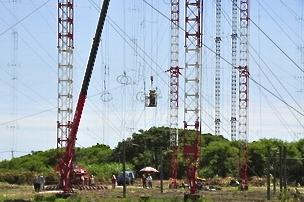The de facto embassy of Taiwan in Washington, called the Taipei Economic and Cultural Representative Office, has given its first official response to claims by an independent Chinese radio station that the national Taiwanese broadcaster is engaged in a precipitate process of dismantling shortwave radio towers that broadcast over mainland China.
Sound of Hope Radio Network has been the most vocal of the stations that will be affected if the teardown of the towers is completed. At least three Members of Congress, all known for support of human rights in China, including Frank Wolf, Dana Rohrabacher, and Christopher Smith, have also written to the office of the president of Taiwan, Ma Ying-jeou, calling on him to intervene and preserve the towers.
The response by the Taipei Economic and Cultural Representative Office, or Tecro, in Washington, says that many of Sound of Hope’s grievances are “completely inconsistent with the facts.” It was posted in Chinese on the agency’s website on the afternoon of July 2, with an English translation to follow. A representative at Tecro could not say who was responsible for the note, and follow-up questions were not immediately answered.
At issue is the plan to dismantle two of Radio Taiwan International’s shortwave broadcast substations: the Tianma substation, located in, Tainan, and one in Huwei, in the county of Yunlin. The plans had been on the cards for several years, as part of efforts to slim down RTI and make it run more efficiently.
A chief point of contention between SOH and RTI is the timing of the teardown, and the exploration of alternatives to outright demolition. Sound of Hope says that RTI has acted covertly and hastily, and repeatedly refused to have meetings with SOH staff to explore any alternative options. Tecro, in the first official Taiwanese response, sought to emphasize that everything proceeded normally, and defended Pu-tsung King, the Ambassador to the United States, who Sound of Hope says played a role in facilitating the rapid teardown work.
In a telephone interview, Sean Lin, the Vice President of Sound of Hope, said that the letter attempted to give the impression that everything in Taiwan was proceeding as normal, but in fact RTI’s behavior was “very abnormal.” He said that after U.S. congressmen had raised concerns over the plans to dismantle the Huwei substation, leaked to SOH by contacts in Tainan rather than formally communicated, instead of seeking dialogue, RTI then quickly added the Tianma substation to the demolition roster. “They hastened the process to demolish the towers,” he said. “During this entire process, they refused to talk to anyone.”
One of the concerns raised by RTI and supporters is that the Huwei substation is inefficient and costly. Lin said: “We have many ways to save costs. If they had talked with us, they would have been happy with our plans. They just didn’t want to sit down.”
The current controversy comes just months after Chunghwa Telecom, Taiwan’s largest telecommunications company, renewed its lease with NTD Television, another independent television broadcaster whose programming is disliked by the Chinese Communist Party. Chunghwa went silent on the renegotiation of a two year lease for one of its satellites, but relented after protests and petitions were held in Taiwan, U.S. Congressmen wrote letters, and Taiwanese politicians and media personalities began speaking out.
Both episodes figure in broader concerns about the curtailment of free speech in Taiwan, a small island off the coast of mainland China with its own constitution, diplomatic corps, and military. Taiwan’s official name is the Republic of China, but the Chinese Communist Party regards it as a renegade province and maintains an extensive network of ballistic and cruise missiles aimed at it.
Relations between Taiwan and the People’s Republic of China have traditionally been tense, but have warmed greatly over the last five years under the Ma administration, who adopted a range of more conciliatory policies towards the PRC.





